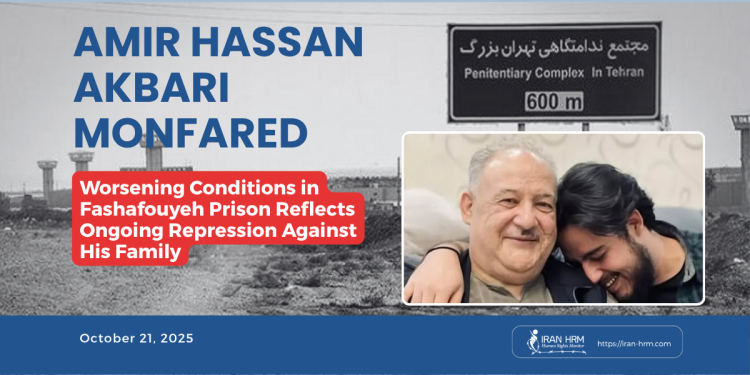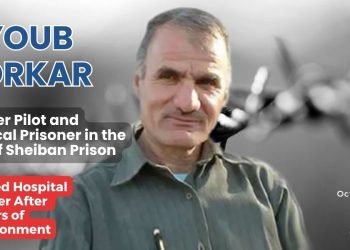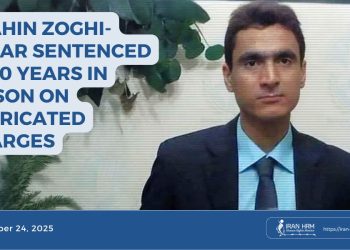Worsening Condition of Amir Hassan Akbari Monfared in Fashafouyeh Prison Reflects Ongoing Repression Against His Family
Iran HRM has received reports from Tehran’s Fashafouyeh Prison (Greater Tehran Penitentiary) indicating a deteriorating physical and mental condition of Amir Hassan Akbari Monfared, a 23-year-old political prisoner who has been held for more than nine months without trial or access to legal counsel. His situation exemplifies the broader pattern of persecution targeting the Akbari Monfared family — his elderly father Mohammad Ali Akbari Monfared, who remains under harsh security supervision in hospital despite severe illness, and his sister Maryam Akbari Monfared, who continues to suffer medical neglect in Qarchak Prison.
Detention Among Dangerous Criminals – A Violation of the Separation of Prisoners
Reliable sources confirm that Amir Hassan Akbari Monfared is being held among inmates convicted of violent crimes and drug-related offenses — a deliberate violation of the principle of separating prisoners by type of charge.
This policy, reportedly imposed by intelligence authorities, has placed him in constant danger and serves as a form of psychological torture.
Recent reports mention multiple incidents of threats and harassment by violent inmates, while prison authorities have ignored repeated requests for his transfer to a safer ward.
Arbitrary Detention and Past Hunger Strike
Amir Hassan was arrested on January 19, 2025 (30 Dey 1403) during a raid on his family home in Tehran by security forces. After enduring months of interrogation and physical and psychological torture in Ward 209 of Evin Prison, he was transferred to Fashafouyeh Prison without charge or verdict.
He has been accused of four serious security-related charges, each carrying a possible ten-year sentence, yet no trial has been held, and no evidence has been presented.
In September 2025 (Shahrivar 1404), in protest of his father’s deteriorating condition and his own legal limbo, Amir Hassan went on a hunger strike. The strike ended after several days due to his worsening health. During this period, a prison official reportedly threatened him, saying:
“We’ll beat you until you forget your own name.”
This statement illustrates the regime’s systematic use of violence and intimidation against political detainees.
A Father in Critical Condition and Denied Medical Release
Mohammad Ali Akbari Monfared, Amir Hassan’s father, is a former political prisoner from the 1980s. He was re-arrested on January 22, 2025 (2 Bahman 1403), just two days after his son’s detention. Following the so-called “12-day conflict” in Evin Prison, he was forcibly transferred to Fashafouyeh.
He suffers from paralysis in both legs, severe diabetes, and a heart condition. Despite a formal forensic ruling of “inability to tolerate imprisonment”, the Ministry of Intelligence has blocked his medical parole.
Doctors have warned that continued denial of treatment could lead to amputation or death. He remains chained to his hospital bed with handcuffs and shackles — a cruel and degrading practice that violates all humanitarian norms.
Maryam Akbari Monfared – A Sister Left Behind in Qarchak
Maryam Akbari Monfared, Amir Hassan’s sister, is one of Iran’s longest-imprisoned female political prisoners. On October 8, 2025 (17 Mehr 1404), while dozens of female political prisoners were transferred from Qarchak Prison to Evin, she was deliberately excluded despite her deteriorating health.
Sources inside Qarchak report that she suffers from chronic back and knee pain, numbness in her legs, and mobility difficulties. Although forensic doctors prescribed daily physiotherapy, prison officials have refused to transfer her for treatment, claiming she “needs the judge’s permission.” Two weeks have passed since her formal request with no response.
Maryam’s continued imprisonment and medical neglect place her in grave danger. She is also a survivor of a family decimated by executions in the 1980s, when three of her brothers and one sister were executed by the ruling regime in Iran. Her endurance has made her a symbol of resistance among female prisoners of conscience.
Systematic Violations of International Law
The Akbari Monfared family’s ordeal reflects ongoing and deliberate violations of Iran’s international obligations. The treatment of Amir Hassan, Mohammad Ali, and Maryam Akbari Monfared contravenes multiple provisions of international human rights law, including:
- Article 7 – International Covenant on Civil and Political Rights (ICCPR): Prohibition of torture and cruel, inhuman, or degrading treatment.
- Article 9 – ICCPR: Protection against arbitrary arrest and detention, and the right to a fair trial.
- Article 10 – ICCPR: Obligation to treat prisoners with humanity and respect for their dignity.
- Article 25 – Universal Declaration of Human Rights (UDHR): Right to medical care and adequate living standards.
Despite clear medical documentation confirming the father and son’s life-threatening conditions, Iranian authorities continue to deny them proper medical treatment and ignore legally binding orders for release on health grounds.
Deadly Silence and International Responsibility
The continued silence of Iran’s judiciary and prison authorities highlights a policy of systematic torture through medical neglect.
Human rights defenders warn that both Amir Hassan and Mohammad Ali Akbari Monfared face imminent danger and hold the Ministry of Intelligence and judicial authorities fully responsible for any harm or death.
The report calls on the United Nations High Commissioner for Human Rights, the UN Special Rapporteur on Iran, and all international human rights bodies to urgently intervene in the case of the Akbari Monfared family and all political prisoners denied medical care in Iran’s prisons.
This family’s decades-long suffering embodies the enduring cost of resistance and the human toll of repression under the ruling regime in Iran.







